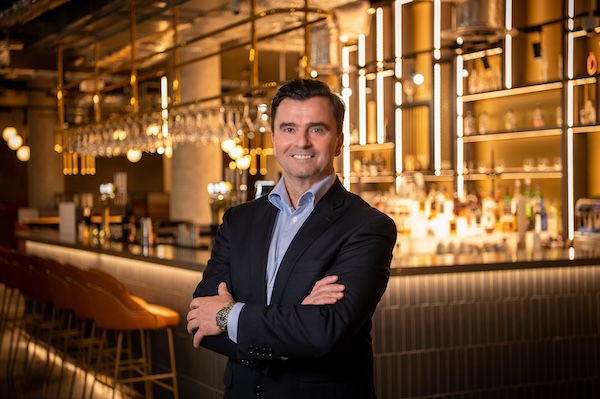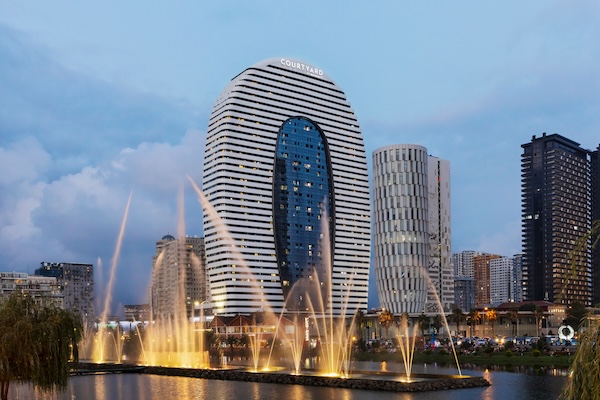Global hotel transactions may not be as liquid as they once were, but when hotels do change hands, Aimbridge, the largest third-party hotel operator in the world, is there and ready to capitalize.
It’s an emphasis that has served the company, which has swelled to more than 1,500 hotels managed globally, well and it’s been a particular priority across Europe, where the third-party management model is still nascent. There, it is left to David Anderson, who is divisional president of Aimbridge EMEA, to build out the managed estate portfolio in Europe, which currently sits at 120 hotels, the bulk of those—around 80—in the United Kingdom. The reason, Anderson said, of why the UK has been strong for Aimbridge is because it has embraced the hotel management agreement model better and faster than other European regions.
“Lenders understand that model and so the UK is always a key part of our growth strategy,” he said, but it’s not the only one.
Now, too, Aimbridge is casting its eyes on Spain, where in early October it announced it had been appointed by Santa Maria Group to manage the independent, 402-room Grand Luxor Hotel & Village resort on the Costa Blanca, marking Aimbridge’s debut in the country.
It was Anderson who originally laid out a business case as to why Aimbridge needed to be in Spain. His reasons were many, with one of the main factors being deal-making in the region. “For the last five years, Spain has seen year-on-year record transactions in hospitality, 58% of those funded from outside of Spain and driven through private equity,” he said.

Unlike the U.S., Spain is dominated by leases, whereby the owner of a hotel property — the landlord — will rent the property to the tenant — or hotel operator — who then uses the lease to run the hotel business. The one catch, that Anderson pointed out, is that Aimbridge doesn’t do leases. However, as the hotel management agreement model evolves and matures across Europe, and with U.S. buyers making inroads, it makes eminent sense for Aimbridge to be in the thick of the hunt for deals.
“If there’s all those transactions, we need to be there because our partners are already owners within the U.S. — the same private equity firms who saw Spain also as a key strategic market,” Anderson said. Aimbridge made a commitment to Spain and deployed resources there, a bit of the chicken and the egg scenario, Anderson called it. “You’ve got to be present,” he said.
Anderson calls the Grand Luxor Hotel & Village “a great one” because of its size and scope and huge demand generator in the next-door Terra Mitica theme park. He added that Aimbridge would put the hotel on the MICE map. (MICE stands for Meetings, Incentives, Conferences and Exhibitions.)
Anderson said they are drumming up more projects in Spain, with approximately 28 active projects Aimbridge is involved in within the last 12 months.

DEALING
Management companies win when they win over owners, who want to put their assets in the hands of operators that know how to both drive top-line revenue and make sure as much of it is dropping down to the bottom line. Hotel management contracts can be as long as 30 years, but, often, when hotels transact, they come so unencumbered, meaning the new owner is free to choose a new brand (or go independent) and a new operator.
All reason why hotels changing hands are like blood in the water for the brand companies and third-party management companies that want the contract. “Transactions are great for our business because investment committees on many of these deals will want to understand what the value add is, the financial KPIs and also the non-financial — like guest-service metrics. And we’re right up there,” Anderson said.
And heavily resourced, which allows Aimbridge to stand out from some its competitors. It’s what Anderson said makes Aimbridge “a compelling operating partner.” In the EMEA region, Anderson said he has 160 above-property personnel, a large portion in finance and a large part in commercial. “We’re resourced to optimize brand performance. We’re resourced to create,” he said.
Consider Europe, which is a high complex region when you think of owners who own hotels in disparate countries, from France to Belgium to Holland to Spain. Anderson maintains that Aimbridge’s financial platform is able to map in exactly the same way, so owners can consolidate across country and across language. He said performance ramp up to market is crucial and, furthermore, what is “hugely important” in transactions is how quickly a transition is and how much time it takes to win market share.
Hotel brand companies, from Hilton to Marriott, Hyatt to IHG, have all pivoted to an asset-light model, where they don’t own assets but derive fees by lending their name and intellectual property — the key growth driver for the brands being getting their name and flag on the building. For those hotels considered trophy or more luxury assets, the brands, typically, like to retain management, such that they are run in a manner that doesn’t wander from the brand standards and principles. More and more, however, the brands have moved away from that game, leaving a vacuum to be filled by a surfeit of management companies waiting in the wings.
Though the U.S. franchise model is mature in the U.S., it’s emerging in Europe, at around a 40% clip, Anderson said. What’s more inviting for management companies is the idea of owners flipping from a managed scenario with the brand to a franchise, “which creates an incredible opportunity for us,” he said. “An owner who says, ‘I don’t want the brand to manage, but I do want the flag.'” Anderson believes Aimbridge’s breadth of work and partnership with the brands makes them a compelling choice for owners since they already manage so many of the brands’ hotels.
He added that as owners — from private equity to high-net-worth individuals — have become less passive with their investments and closer to the hotels they own, the more a management company’s expertise matters. “They have become hotel experts,” Anderson said.
He also acknowledges some of the frustration owners have had with brands in the past, primarily vexation on things like pass-through costs. In addition, owners, today, want more plasticity in the their hotel management agreements. Anderson said Aimbridge’s brand relationships and owner alignment allow them to maximize an asset’s cash flow and ROI at exit. “We align with the owner in their strategy,” he said. “So, if they say, ‘Look, we’re looking to buy this value-add portfolio, we’re going to renovate and we’re probably going to hold it for five years. We need someone who is going to project manage and give us flexibility with the HMA so down the line we can maximize the value of that asset and be able to, if required, sell unencumbered of operator.’ We align with that; it’s very appealing now to a lot of owners.”

EASTBOUND
Western Europe isn’t the only region Aimbridge is looking to expand within. Prior to the Russia invasion of Ukraine, Aimbridge managed nine hotels in Moscow and exited in July 2022 in light of U.S. sanctions. Aimbridge took its corporate team and created an office in Tbilisi, Georgia, where in June 2023 it signed a management agreement with Alliance Group, one of the largest developers in Georgia, on the Alliance Palace Aparthotel in Batumi, Georgia’s second-largest city and on the shores of the Black Sea.
The farther Aimbridge moves east, the less the traditional hotel management agreement is employed or understood. Anderson said that is changing. In Armenia, Aimbridge manages The Alexander, a Luxury Collection Hotel, in the country’s capital of Yerevan. It also manages a Residence Inn in Sarajevo. The Middle East could become another region of interest. “There are no real operators of scale in the Middle East,” Anderson said. “We are always assessing the Middle East on the basis of what the brands tell us, that when they come to renew their HMA, some of them will say, ‘You know what, I would love to keep your flag, but manage independently of you.’ That’s something that is happening in the hotel space in the Middle East, where the idea of a third-party operator is desirable.”
Still, third-party operations can even take exotic form outside the U.S., specifically. Consider the structure of a recent Aimbridge deal in Leeds, U.K., on the dual-brand Hyatt Sovereign Square, which recently concluded its topping-off phase and is slated to open next year. The 12-story hotel is a joint venture formed by UK-based property asset management Marrico and real estate developer Helios for the UK Commercial Property REIT (UKCM) and Hyatt Hotels. Aimbridge will manage the property, but in a twist, it entered into a 25-year franchise agreement with Hyatt Hotels.
Anderson said it works similar to a straightforward management agreement, with some distinctions. Including negotiating a termination clause with the brand, the structure works by Aimbridge paying itself a base fee and incentive fee, but then would pull funds out of the property for items like FF&E and other expenses. “Whatever was left then goes back to the fund,” Anderson said, adding that owners see the upside in this because it allows them less exposure.
“It’s something that has created a lot of interest in the U.K. and for other REITs who have never delved into the hotel business,” he said.
